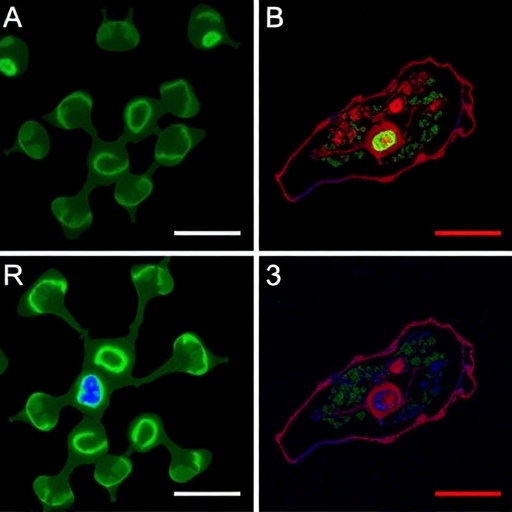Scientists have discovered a new type of immune cell that could predict which lung cancer patients will benefit most from immunotherapy treatment, according to a Cancer Research UK funded study* published today (Monday) in Nature Immunology.
Researchers at the University of Southampton and La Jolla Institute for Allergy & Immunology, California, found that lung cancer patients** with large amounts of a particular type of immune T-cell, called tissue-resident memory T-cells, in their tumour were 34 per cent less likely to die.
The study also found that it was not just the numbers of cells that increased survival, but the cells' behaviour played a key role. The cells clustered together and 'took up residency' in a particular tissue, in this case the cancer tissue, to protect the patient.
These new T-cells also produce other molecules that attack the tumour, meaning that the body's immune system could be more likely to hunt out and destroy cancer cells.
Immunotherapies have shown great promise in the last decade, but identifying which patients respond to treatment and which don't has proven difficult.
In future, testing for levels of these cells could help doctors identify which patients will benefit most from immunotherapies that help to ramp up the body's attack on the cancer.
Scientists could take this one step further by using the T-cell as a template to develop a vaccine to boost immunotherapy even more – helping to tackle one of the hardest to treat cancers.
Professor Christian Ottensmeier, Cancer Research UK scientist at the University of Southampton, said: "These are hugely exciting results. For the first time we have a real indication of who might benefit from a particular drug before we make treatment decisions. So far when we use immunotherapy we do not know if a patient will benefit. The new findings are a big step towards making this exciting treatment much more predictable.
"Our results will also make the treatment pathway more reassuring for our patients. And if we can translate our finding into clinical practice, then we will also save patients unnecessary side effects and reduce costs to the NHS."
Around 35,600 people die from lung cancer each year in the UK, making it the most common cause of cancer death in the UK.
Dr Justine Alford, senior science information officer at Cancer Research UK, said: "The immune system can play a powerful role in fighting lung cancer, and this research sheds more light on the interplay between cancer, our immune system, and immunotherapies.
"Cancer Research UK is focusing more research on hard to treat cancers, like lung cancer, where survival has remained stubbornly low. And research like this is crucial to understanding why some people with lung cancer respond well to treatment and, in future, could guide more personalised treatments for patients."
###
For media enquiries contact Stephanie McClellan in the Cancer Research UK press office on 020 3469 5314 or, out of hours, on 07050 264 059.
Notes to editor:
* Ganesan et al. Tissue-resident memory features are linked to the magnitude of cytotoxic T cell responses in human lung cancer. Nature Immunology
**In the study, samples from patients with early-stage lung cancer (stage I-IIIa) were analysed for potential new biomarkers for anti-cancer immune responses. Those identified were then mapped against outcomes for almost 700 patients.
This research was supported by the Wessex Clinical Research Network and the National Institute of Health Research, UK (sample collection), Cancer Research UK (O.W., E.V.K., C.H.O.; and C11512/A20256, for CD103 pathology analysis), the William K. Bowes Jr Foundation (P.V.) and the Faculty of Medicine of the University of Southampton (P.V., T.S.-E. and C.H.O.).
Building on its cancer immunology research expertise and recent successes in immunotherapy trials, the University of Southampton is building the UK's first dedicated Centre for Cancer Immunology at Southampton General Hospital, set to open in the Autumn. The £25m Centre will be the first of its kind in the UK and will bring together world-leading specialists in a unique state-of-the art centre. The aim of the new Centre is to accelerate research progress, conduct more clinical trials and save more lives from cancer. Find out more about it at http://www.southampton.ac.uk/youreit
About Cancer Research UK
- Cancer Research UK is the world's leading cancer charity dedicated to saving lives through research.
- Cancer Research UK's pioneering work into the prevention, diagnosis and treatment of cancer has helped save millions of lives.
- Cancer Research UK receives no government funding for its life-saving research. Every step it makes towards beating cancer relies on vital donations from the public.
- Cancer Research UK has been at the heart of the progress that has already seen survival in the UK double in the last forty years.
- Today, 2 in 4 people survive their cancer for at least 10 years. Cancer Research UK's ambition is to accelerate progress so that by 2034, 3 in 4 people will survive their cancer for at least 10 years.
- Cancer Research UK supports research into all aspects of cancer through the work of over 4,000 scientists, doctors and nurses.
- Together with its partners and supporters, Cancer Research UK's vision is to bring forward the day when all cancers are cured.
For further information about Cancer Research UK's work or to find out how to support the charity, please call 0300 123 1022 or visit http://www.cancerresearchuk.org. Follow us on Twitter and Facebook.
Media Contact
Stephanie McClellan
[email protected]
44-203-469-5314
@CR_UK
http://www.cancerresearchuk.org
http://dx.doi.org/10.1038/ni.3775
############
Story Source: Materials provided by Scienmag




